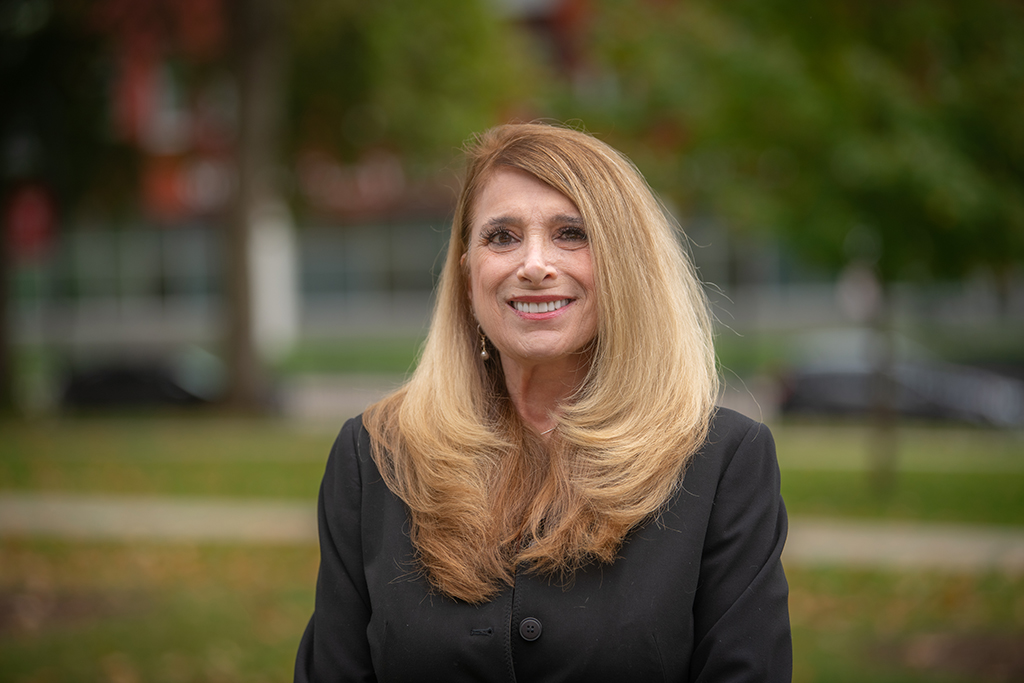‘Clark has always been a beacon’

Randi Nichols’ entire career has prepared her for the role of chief human resources officer at Clark — a newly established position that she will assume on Nov. 1. Nichols joins Clark with deep experience as a successful human resources leader in health care, manufacturing, and high tech, and has found a new home in higher education, where she’s long wanted to apply her strong management talents and innovative spirit in a setting that aligns with her values and interests. She took a break recently from the endless tasks involved with completing her move from Delaware back to Worcester County (she lived in the city for more than 30 years) to discuss her excitement about being back on familiar ground and her eagerness to become an integral contributor to the Clark community.
You lived in Worcester for more than three decades, moved away, and now you’re back in the area. How has the move been for you?
Getting everything together with a move is always a challenge, but coming back to where I started and where I raised my family is incredible because I can see how the community has evolved.
What was it about this position that intrigued you enough to come to Clark?
It’s a combination of many things. Having lived in Worcester for so long, I know Clark’s reputation, and it has always been a beacon in the city. I also feel a personal affiliation with the university because of my own studies in psychology, and knowing what an incredible school Clark is in this regard.
I was very excited when I saw this opportunity because I’ve wanted to work in academia and get to know and understand it more broadly. It was an honor to even be considered for this role, and I’m thrilled that I was chosen.
Could you talk a little more about higher education as your desired destination, and what it means for Clark to have you?
I’ve spent most of my career in health care, and I’ve loved it, but for me, it was about going to the next step in terms of something more diverse and more interesting; something I feel aligned with. I like the dichotomy of student relations, the academics, and how executive leadership works within a university. So I was attracted to it because of, for lack of a better term, the service that’s being offered.
At Clark, there’s a lot of opportunity to bridge some culture-transformation issues in different areas, and I bring a toolkit to help with the strategic side of human resources. The human resources team is so hungry and excited for it! They look forward to us working together to evolve into a more robust strategic and tactical support system for Clark. I am honored to work with this team. They have done great work within Human Resources.
Talent recruitment is a significant piece of your professional profile. How will you apply it to Clark?
My background in talent acquisition is an important reason why I was hired. I started my career in talent acquisition and was a recruiter for many years, so I have a lot of experience in it. Most recently, at Bayhealth Medical Center, where I worked prior to Clark, I had to fill 896 positions with a team of recruiters. But it takes more than hands-on work to recruit effectively — it’s very critical to have a strategic plan for recruitment. How do we get good people in the door; how do we onboard them; how do we retain them? There’s an entire life cycle to the process. I’ve been leading that process throughout my career.
What was your path to the HR field?
I’d earned my bachelor’s degree in psychology and had been accepted into a Ph.D. program — I was going to be a psychologist. One of my professors told me I also have a very strong business mind. He said, “If I were you, I would go for your MBA and a Master of Science in Human Resources Management, which is going to take off.” And so I started from the beginning. I went to grad school, got my MBA, and got my Master of Science in Human Resources. I took his advice and haven’t looked back.
Like many, you managed through the COVID pandemic. Are you seeing lingering impacts in the workplace from that time?
Yes, most definitely — it’s a whole new HR world. The most obvious effect is remote work, and the expectations surrounding it. When I started at Bayhealth, there was no remote work, and my philosophy was that we need to explore it so people feel safe and can do their job in a way that works for them. By the time I resigned, we had almost 500 people remote, and we developed a very strong sense of belonging by enabling that process. Maintaining and managing a hybrid workforce will continue to be the biggest issue we face from the pandemic.
What do you do to decompress from the job?
I love to read and I love theater. As a member of the Hanover Theatre, I don’t miss those shows; making time for cultural events is so important to me.
I’m also learning pickleball, and loving it. I was a competitive tennis player, and while I’m something of a beginner at pickleball, I can tell it’s going to be a passion of mine.


